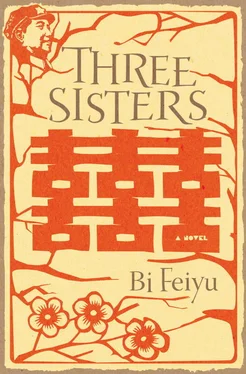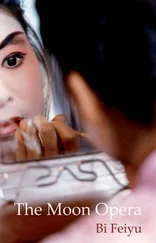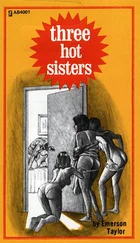But they were wrong. No one knew how much Yumi suffered. She could not do without those letters, but they brought her much anxiety day and night. They became a secret torment. She had completed the elementary level of primary school and would have continued on to the advanced level and, had there been one in the village, to middle school. There was neither. So she’d had only three years of schooling at the elementary level, which meant only two years’ instruction in reading.
In those years, Yumi did well in most things, but the act of writing was hard for her. And no one could have anticipated the possibility that her courtship would be carried on via the written word. One after another the letters arrived from Peng Guoliang, each one creating a need for a response, making a difficult task even more so for Yumi, an introverted young woman who, like all such women, possessed a second pair of eyes that looked inward. These inward-looking eyes illuminated every corner of her heart with extraordinary clarity. But her problem was that she could not transfer the contents of her heart onto a sheet of paper. She simply couldn’t. No sentence, no word, afforded her the opportunity to say what she wanted to say. And there was no one she could ask for help. Anguished, she could only cry.
If only Peng Guoliang could be there beside her, she wouldn’t need words. She could talk to him with her eyes or with her fingers, or even with her silhouette. But since that was not possible, she could only bury the imagined face-to-face meeting in her heart and restrain herself. Tender feelings filled her breast like moonbeams that blanketed and illuminated a courtyard. Reaching out with her hand, she created a shadow. But she could not grab hold of these moonbeams. She tried, but when she opened her hand, all that remained were her five fingers. The moonbeams resisted all attempts to fit into a letter.
Yumi sneaked Yuye’s New China Dictionary out of the room. But what good would that do, since she didn’t know how to use it? All those unfamiliar words were like schooling fish—knowing they were just beneath the surface did not help her find the ones she wanted. It was hard, nerve-racking work. She rapped herself on the forehead. What’s the word I want? Where do I find it? All those missing words held her back. When they simply would not come, she stared at her paper and pen, and fell into despair. Everything she wanted to say turned to tears. With her hands clasped in front of her, she pleaded, “Why won’t the heavens take pity on me? Please, please, take pity on me.”
Yumi picked up Wang Hongbing and went for a walk, unable to abide another minute in the house, where she was tormented by the unrelenting thought of writing a letter. Her mind was in a fog, her energy depleted. Romance—just what is it? The concept evaded her, and all she could do was talk to Peng Guoliang in her heart. Even then, the finest words she could imagine could not be transferred onto paper. They clogged her heart, bringing only pain. She felt trapped, and there was nothing she could do about it. She was awash in a turmoil caused by sadness, anxiety, oppression, and exhaustion. Fortunately, Yumi was gifted with an extraordinary ability to hold things inside. No one knew what she was going through, even though she grew more gaunt every day.
With Hongbing in her arms, Yumi arrived at the home of Zhang Rujun, whose wife had given birth to a baby—a boy—the year before. They had much to talk about. Rujun’s wife, who suffered from an eye problem, was not a pretty woman and thus held no attraction for Yumi’s father, a Party secretary. Yumi was sure of that.
Which women her father was involved with, and when, never escaped Yumi’s sharp eye. Any woman who treated her with uncommon courtesy immediately put her on alert. She’d had a lot of that. Behind it lay guilt and flattery, an appearance of warmth that masked a sense of dread. The courtesy would be accompanied by the nervous running of fingers through hair. But the real proof was in the eyes, which darted around as if wanting to take in everything while daring to look at nothing, like those of a cornered rat. Go ahead, be as courteous as you like, Yumi would think, you shameless slut. All those nice manners do not alter the fact that you’re a trollop, cheap goods. No friendly look from Yumi ever greeted those women. The funny thing was, the more obvious Yumi’s frosty look, the more polite the women became; that, in turn, only increased the intensity of Yumi’s look. You deserve nothing less, you stinking whore. All good-looking women are trash. If Wang Lianfang hadn’t emptied his virility into their bodies, Mama would not have had so many girls. As for Yuxiu, the pretty daughter, Yumi predicted that she’d one day be unable to keep her belt on snugly as well, even though she was Yumi’s natural sister.
Rujun’s wife was different. She was not pretty, but she was a person of substance; her every action befitted a true woman. She conducted herself in an appropriate, tasteful manner, and her eyes never betrayed a hint of evasiveness. She was not an ignorant woman, which was why Yumi found it so easy to talk to her. But there was another reason why Yumi treated her so well: Her husband was a Zhang, not a Wang. All the residents of Wang Family Village shared one of two surnames: Wang or Zhang. Yumi’s grandfather had told her of the fierce enmity between the two clans, an entrenched hatred that had led to many fights and at least a few deaths. One evening, when Wang Lianfang was home drinking with some village cadres, the name Zhang came up, sparking him to pound the table. “Two surnames isn’t the problem,” he said. “We’re talking about two distinct classes.”
Yumi, who happened to be in the kitchen lighting a fire in the stove, heard every word. Currently the two clans lived in peace and enjoyed an atmosphere of relative tranquillity with no outward signs of discord. And yet people had died in the past, a fact that could not be brushed away. The dead had borne their rage into the grave, and one day it would sprout anew. However placid things seemed, however harmonious the surface or calm the winds, a powerful undercurrent of hostility lay hidden deep in the hearts of the Zhang clan. They always addressed Yumi’s father as Secretary Wang, but just because the enmity was not in full view did not negate its existence. If every important matter were out in the open, people would not be people; they’d be more like pigs and dogs. And so Yumi used the more common forms of address with members of the Wang clan, reserving such intimate terms as “sister” and “aunty” for members of the Zhang clan. She kept outsiders close, like family, precisely because they couldn’t be trusted like family.
Cradling her baby brother, Yumi had a casual conversation with Sister Zhang just inside the gate. Rujun’s wife, who had been holding her own son when she spotted Yumi, quickly carried the boy inside and returned with a stool. She reached out to take Hongbing. “A change will do you good,” she said when Yumi held back. “Food from a neighbor’s pot always tastes better.”
Yumi sat down and glanced at the end of the lane. That glance did not escape Rujun’s wife, who knew that the visit, like others in recent days, had more to do with where she lived than who she was, for her house was an ideal vantage point to spot the arrival of the postman. She did not, however, let on and chose instead to sing the praises of little Wang Hongbing. There are countless ways to make a mistake; heaping praise on someone’s child is not one of them. She and her visitor had been chatting about a variety of things for a while, when Rujun’s wife saw Yumi sit up tall and peer over her head. Knowing that someone was coming their way, Rujun’s wife lowered her head and listened carefully.
Читать дальше











